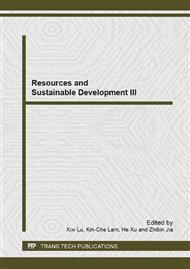p.2347
p.2351
p.2355
p.2360
p.2364
p.2369
p.2373
p.2377
p.2381
Evaluation and Analysis of Time-Space Disparities on Low-Carbon Economic Development in Hebei Province
Abstract:
In order to deal with global warming, resource depletion and environmental degradation, China must develop low-carbon economy to cope with global climate change and maintain sustainable economic development. The important step in the transfer of low-carbon economy from the theoretical stage to practical application stage is to evaluate the level of economic development of low-carbon and to study its time-space disparities. In this paper, a low-carbon economy index system is used to evaluate comprehensively low-carbon economic development in Hebei Province. The evaluation results are analyzed to verify that the results are consistent with the actual situation of low-carbon economic development by using space-time analysis method.
Info:
Periodical:
Pages:
2364-2368
Citation:
Online since:
June 2014
Authors:
Price:
Сopyright:
© 2014 Trans Tech Publications Ltd. All Rights Reserved
Share:
Citation:


